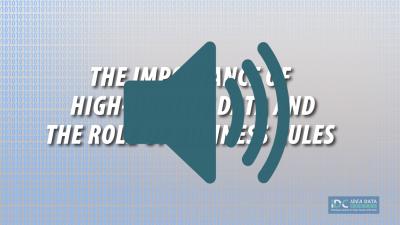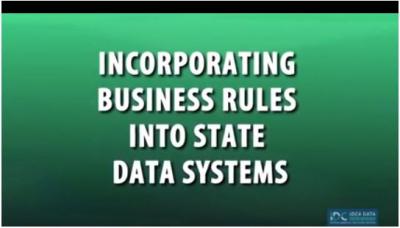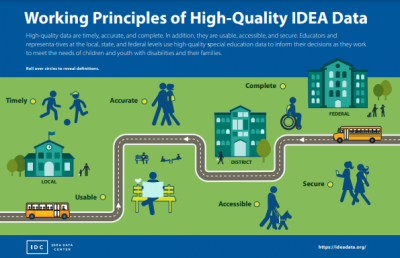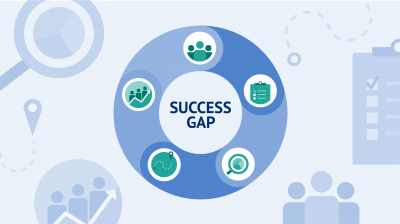
Resource Library
Guides. Briefs. Toolkits. Quick reference information. IDC and its partners created these data quality resources to help states better prepare to address their existing or emerging IDEA data quality needs. Use our search and filtering tools to navigate the library.
Resources 1 - 7 of 11
Format: Trainings
The Importance of High-Quality Data and the Role of Business RulesThe Importance of High-Quality Data and the Role of Business Rules instructional video provides a brief introduction to the concept of using business rules to promote and support the collection of high-quality data within state and local systems for IDEA Part B and C.
Format: Trainings
Incorporating Business Rules Into State Data SystemsThe Incorporating Business Rules Into State Data Systems instructional video explores the different ways Part B and Part C state agencies can incorporate business rules into their IDEA state data collection and reporting systems.
Format: Guides and Briefs
Examining Representation and Identification: Over, Under, or Both?Significant disproportionality with regard to identifying children as children with disabilities or as children with specific disabilities is, by definition, overrepresentation. This resource defines overrepresentation and three related terms: over-identification, under-identification, and underrepresentation. States can use this resource, in conjunction with the Success Gaps Toolkit to help identify and address the factors contributing to significant disproportionality (i.e., overrepresentation) within school districts.
Format: Quick Reference
Working Principles of High-Quality IDEA DataUse this interactive PDF to learn more about the different components of high-quality data.
Format: Toolkits
LEA Data Processes ToolkitThere is a continuous need for state education agencies (SEAs) and local education agencies (LEAs) to collect and report comprehensive, high-quality data and ensure they report data accurately and in a timely fashion. The customizable IDC LEA Data Processes Toolkit is a new instrument that can improve decisionmaking about children and youth with disabilities by ensuring data are of high quality and processes are clearly defined and documented, while also providing data staff a map for documenting data processes within local districts.
Format: Applications and Spreadsheets
Equity Requirements in IDEAThis resource compares the three equity requirements in IDEA (disproportionate representation, significant discrepancy, and significant disproportionality) across various elements to explain the similarities and the differences among the requirements.
Format: Toolkits
Success Gaps Toolkit: Addressing Equity, Inclusion, and OpportunityThe Success Gaps Toolkit presents a process for using data and the Success Gap Rubric to identify root causes of gaps between groups of children in districts or schools. These success gaps occur when the education system is not meeting the needs of all groups of children and outcomes for some groups are different than outcomes for most groups. The toolkit, with its process and materials, provides a manageable and defined way for districts or schools to identify success gaps that are present and their root causes and then make a plan for addressing the gaps. The success gaps may be the graduation rate of students who are English learners compared to the rate of all other children, the out-of-school suspension rate of children who are Black compared to the rate of all other children, the identification of children who are Hispanic as children with specific learning disabilities compared to the identification of all other children, and other gaps.








